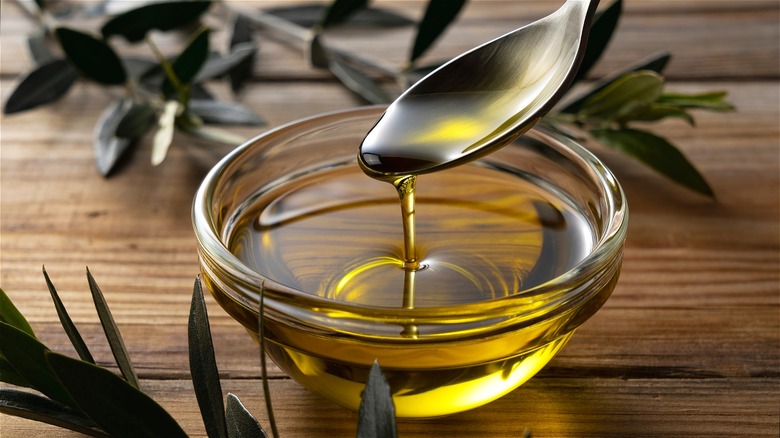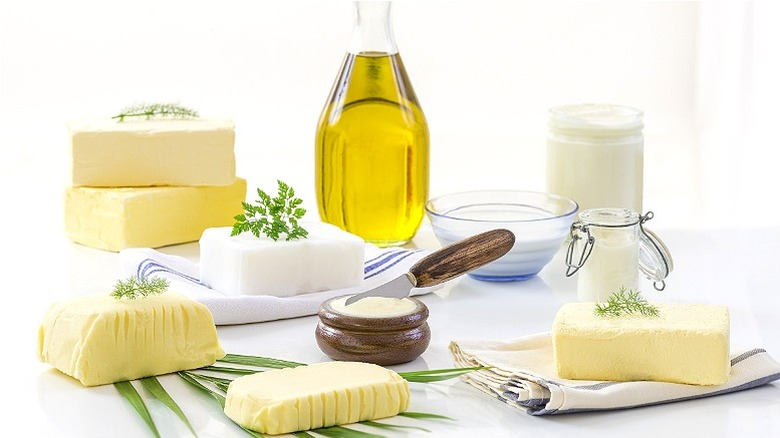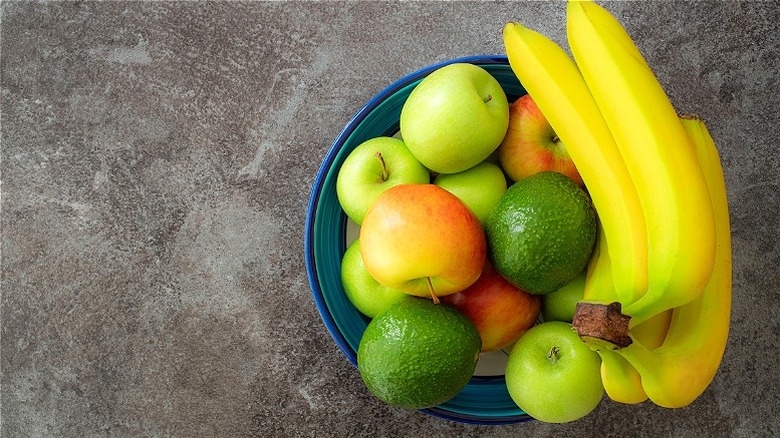The Golden Rule To Follow When Using Olive Oil In Place Of Butter
Who doesn't love a nice pat of butter atop mashed potatoes or a heaping slather of the golden spread on freshly toasted bread? After all, culinary icon Julia Child was quoted in her affirmation that "with enough butter, anything is good." Yet, the Chicago Tribune details that throughout the last several years, the campaign to convince consumers to choose olive oil over butter has taken hold.
According to The Philadelphia Tribune, both olive oil and butter are considered fats, yet some health-conscious consumers may be choosing olive oil for its comparatively lower saturated fat content. Healthline points out that butter is also made up of not only fat but milk solids: therefore, folks who consider themselves lactose intolerant may opt to use olive oil as a sufficient replacement.
As far as famous chefs' opinions go, despite the staggering amount of butter Ree Drummond goes through, Martha Stewart believes that when you want to add a unique taste to your dishes, olive oil serves as an excellent butter substitute. Stewart also praises the added benefit of consuming polyphenols, which are beneficial compounds found in specific plant foods. If you do decide to give this swap a try, you want to be careful when substituting since no two fats are created equal. Keep this one specific guideline in mind and you'll be set for culinary success.
Measure your substitutions carefully
You don't have to make the difficult decision of choosing between olive oil and butter since in most cases, you can use them interchangeably. The most important thing to remember if doing so is the amount of olive oil you use will be less than the amount of butter — they cannot be substituted on a 1:1 ratio.
According to California Olive Ranch, you want to use 3/4 of the olive oil instead of the recommended amount of butter. If you want a detailed conversion chart breaking down amounts by teaspoons and cup measurements, visit The Olive Tap website.
Besides this very important measurement adjustment, the one exception to using olive oil for butter is usually relegated to room-temperature butter. The Washington Post claims olive oil should only be used as a replacement in recipes calling for melted butter. King Arthur Flour Baking Company notes the importance of creaming butter and sugar in baked goods: Sugar is whipped at high speed to create pockets of air within the butter, creating a perfectly springy texture in whichever cookie, cake, or muffin you're attempting. You can't mimic this particular process with liquid olive oil. Yet the amber-hued liquid proves to be a great substitution for butter in most cases. Though consuming olive oil has been proven to be beneficial based on one 2018 study, there are additional swaps you may want to consider the next time you're up for trying a different fat substitute.
What else can you swap for butter?
According to California Olive Ranch, olive oil can serve as a great option to bake with since it adds a special texture to baked goods and imbues most savory and sweet recipes with that defined fruity, floral taste. After all, there wouldn't be olive oil cake recipes without the stuff. Olive oil does impart a distinct flavor though, so Martha Stewart suggests choosing a milder extra virgin olive oil when baking so the flavor doesn't overpower your recipes.
Olive oil isn't your only option though: Food Network insists any oil will work as a general cooking substitute. Yet when it comes to baking, besides olive oil, Healthline suggests ghee and coconut oil are also great alternatives. The benefit of using either of these latter options is that you don't have to worry about measuring since they serve as a replacement for butter on a 1:1 ratio.
If you'd like to skip the fat altogether, you can even try one of many whole-food options that work especially well in baked goods. Food Network suggests trying avocado, applesauce, and even bananas. Just keep in mind that these alternatives will definitely add a distinct flavor component to your recipes. Whether you decide on olive oil, ghee, or bananas, there are a lot of great replacements for butter. When using olive oil though, don't forget to use less or skip the swap altogether if room-temperature butter is recommended.


